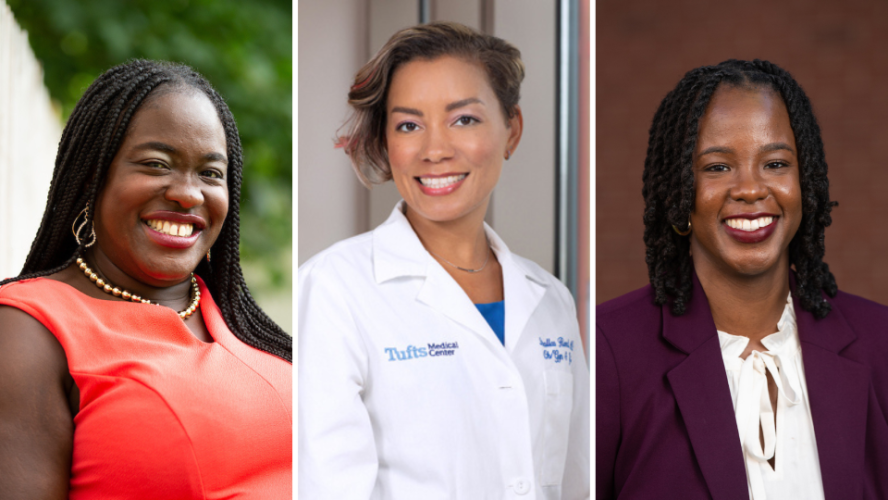-
About
-
Academics
- Physician Assistant
- Special Master’s (MBS)
-
Admissions & Financial Aid
- Tuition & Fees
-
Student Life
-
Research
- Research Labs & Centers
-
Local & Global Engagement
- Global Health Program
- Dean’s Medal Recipients
Honoring Black Heritage through Research and Practice
Black faculty members connect their personal experiences and family histories to their contributions to the academic enterprise at Tufts

In recognition of Black Legacy Month, Tufts Now asked Black faculty members to share their perspectives on how their research, scholarship, and practice connect to their sense of identity. Whether looking to give back, remedy historical wrongs, prevent ongoing societal distress, or connect with their forebears, they all see clearly how what they do is informed by who they are.
A Long Line of Maternal Activists
"I founded the Center for Black Maternal Health and Reproductive Justice at Tufts University School of Medicine. It’s the only center in the country that focuses on maternal health inequities. Because the health system doesn’t value the birthing experiences—or the lives—of Black and brown people, our work is so necessary. I can trace a direct line from my heritage to my work: I hold a professorship that carries the name of my grandmother, who was a village midwife in Nigeria. She delivered hundreds of babies—including my mom. In the 1970s, my parents emigrated to the United States. My mother raised four kids in a foreign country where she had no family support. I come from this legacy of strong women who are servants in the maternal space, and that absolutely informs my work and the way that I approach maternal activism." - Ndidiamaka Amutah-Onukagha, Julia A. Okoro Professor of Black Maternal Health, Tufts University School of Medicine
Taking Care of Mothers and Babies—on Two Fronts
"In preschool, I declared that I wanted to be a doctor someday. My commitment to health care started early! But it really took hold when I was older, and my mom gave birth to my brother, who had a terminal genetic illness. We didn’t get a diagnosis immediately but eventually did; he died at four months old. I knew then that I wanted to go into genetics, but I also held on to my dream of becoming a doctor, and, specifically, an obstetrician. Now, I’m one of a few thousand medical geneticists in the United States, one of about 40 OB/GYN geneticists—and one of about ten Black medical geneticists. My experience with my brother made me want to become the person that my family needed but didn’t have at the time. But Black maternal morbidity and mortality are top of the news these days, and every day I see how scared my Black patients are. Coming into an appointment with a provider who, rightly or wrongly, they feel they already have a connection with I think comforts many of them. I’m glad I can be that person." - Dallas Reed, Assistant Professor, Tufts University School of Medicine and Chief of Genetics, Tufts Medical Center
Giving Back to the Deep South
"Fannie Lou Hamer was a civil rights activist who coined the term “Mississippi appendectomy,” referring to the forced sterilization of Black women. That was a practice that started in the early 20th century and continued through the 1980s. I was born in the 1980s, in Mississippi, and Hamer was a hero of mine. Very early on, I saw so many avenues of injustice around me, so much inequity; I wanted to know why some people have and some people have not. That, along with my love of learning, set the foundation for my career as a health equity research scientist. I investigate, design, and apply evidence-based methodologies that address the complexities and intersectionality of racism, gender bias, and gaps in policy to elevate the quality of life for many underserved communities. In both my teaching and my research, I center the use and establishment of equity initiatives to optimize sexual and reproductive health and nutritional health justice. Recently, I was in the Mississippi Delta working, in conjunction with colleagues from the Friedman School, on a study aiming to help people in the community improve their diets. I felt a lot of pride in going back home to use my resources and connections in a way that can help me give back to my original community. In everything I do to work toward health justice, I keep my background in mind." - Vanessa Nicholson, Assistant Professor, Public Health and Community Medicine, Tufts University School of Medicine